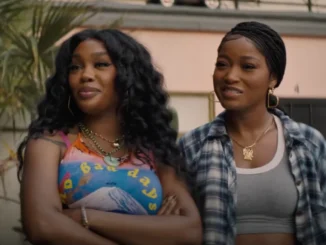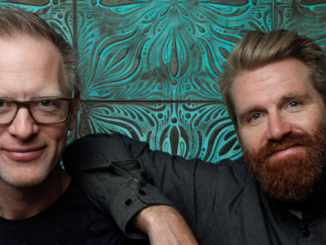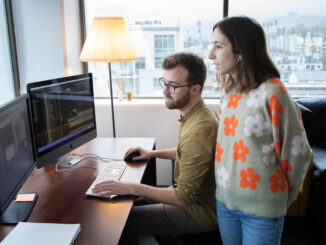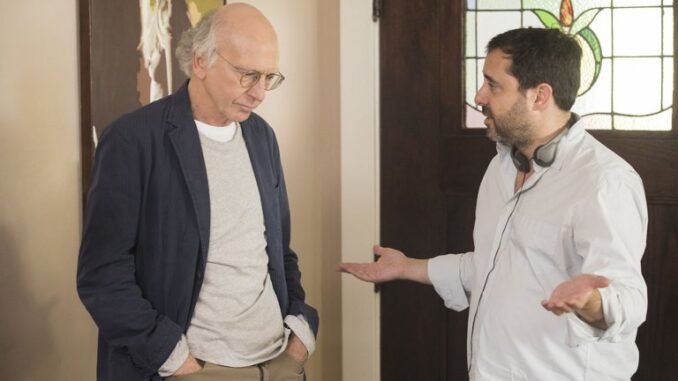
by A.J. Catoline
Most television editors go from project-to-project, hoping for a show to last a few seasons. But not Steven Rasch, ACE, who has had a 20-year dream gig editing all 10 seasons of HBO’s “Curb Your Enthusiasm.”
That’s the better part of two decades — less some years on hiatus — in a small, dark room with star and creator Larry David.
“Either I’m the most pitiful editor in Hollywood,” Rasch joked, “or the smartest and the luckiest.”
This season of “Curb,” which premiered in January, will send the series past the 100-episode mark. Rasch has edited 50 of them and served as the Supervising Editor on the show. In the earlier seasons he was joined by editors Jon Corn and Grady Cooper, and in recent seasons by Roger Nygard and Tim Roche.
Rasch has been with the show since its inception. In the late 1990s, he was editing standup and variety comedy specials when he met director Robert Weide, then producing a one-hour mock-umentary called “Larry David: Curb Your Enthusiasm” (1999). Weide hired Rasch to edit the special. Unintentionally this became the pilot for the longest running show on HBO.
Rasch remembers the day he heard the news HBO wanted more episodes.
“It was Halloween night, not long after we mixed the special and sent it to HBO,” he said. “I remember opening the door for trick-or-treaters. And standing there was Larry and his daughter. I said ‘Hi Larry!’ It was random. He didn’t know I lived there and he was surprised and said, ‘Hi Steve! HBO liked the show and it looks like we are going to make a series.’ What a way to get a gig! I always wondered if I hadn’t opened the door, would Larry have hired me?”
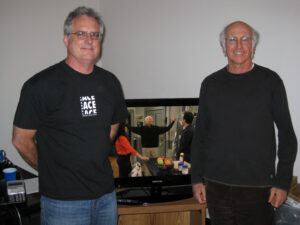
“Every season the show was renewed, it was the best job I wanted,” Rasch said. “I would look at my options and I think ‘I’m going back to Larry.’ He likes what I do and I like what he does.”
An unscripted television editor always faces the challenge of finding the story in the editing room. For each episode of “Curb,” David writes a 10-page outline script that lays out the tentpoles of the story, specifying key jokes and Larry lines that establish a comedic premise to be explored.
There are the immortal catchphrases: “Prett-ay, prett-ay, prett-ay good.” “Are you my Caucasian?” “Have some more lobster.” “Nice chat and cut!” “Do you respect wood?” And Larry-isms such as: “A date is an experience you have with another person that makes you appreciate being alone.”
Beyond the short outline, the show is entirely improvised. In the editing room upstairs from David’s office in West Los Angeles, Rasch is surrounded by binders as thick as three paper reams, bulging with transcripts of the footage. “And the pages are double-sided!” he said.
CineMontage sat down with Rasch and series director Jeff Schaffer at David’s office, which has been used many times as a location on the show. David walked in from his parking spot marked “Mr. Wonderful” and sat at his iconic desk eating a healthy breakfast and a blueberry muffin (“I can’t really tell that its gluten-free,” he said).
CineMontage: How have you managed to keep the same editor Steve for 20 years, Larry?
Steve Rasch: I think we’ve been together way longer than a marriage.
Jeff Schaffer: You saw each other for intense bouts, but I think it worked because you took time off from each other.
Larry David: There was some hiatus in there. It worked out great.
Larry, do you watch all the footage or do you have a lot of trust in the takes Steve and the editors are choosing?
Larry: I have a lot of trust in Steve and the other editors. But I watch every single take. The hardest part of doing this show for me is watching all the footage. In the first couple of seasons it took about three days to watch everything. And now we shoot more, so it’s four days, sometimes five, right?
Steve: I think I have about a month of editing on each episode. Editing unscripted TV takes a while.
Jeff: The footprint of the show is usually about 18 months. About six months of writing. Six months of production. And six months in post-production.
Larry: It’s a long and tedious process. Before we started each season I thought, “Can I go through all that footage again?”
Note: A 2017 Netflix documentary “Long Shot” is about a lawyer who proved his client’s innocence in a 2003 murder case when he learned his client may have appeared in raw footage of “Curb” shot on location at Dodger Stadium. The show granted the lawyer access to screen the footage and remarkably he found a shot which proved his client’s alibi. It was the only case of anyone other than David and the editors watching all the footage from a scene in “Curb Your Enthusiasm.”
Q: Larry, do you find editing a challenge?
Larry: I love editing. But only after I go through all the footage. Then I love it. It’s the chiseling-away and refining part of editing that I love. There’s a lot of different dialogue from take to take. I wonder if it has gotten easier for Steve over the years? Do you have a routine or technique that you didn’t have the first few seasons?
Steve: The biggest challenge editing improv is, how do I find the dialogue? Who says what, when? In the transcripts I would note in the margins a rating system next to the funniest lines. One star if it made me chuckle, 2 stars for a good laugh, 3 if it definitely was going in the cut. Only then could I cut the scene. I was given weeks to do a first cut. You need that amount of time to get it right. There are no circle takes. I do get some notes from the set when Larry tells the director that was a good take. Or he looks at the camera and we can see what Larry thinks.
Jeff: It’s improv, and the actors will often go off on a tangent that may not be funny, or it may be funny but it’s not a plot-point in Larry’s script outline. Larry will be clocking those points along the improv during shooting, and if the actors aren’t hitting the story points he will turn to camera and make a face.
Steve: Sometimes Larry looks right to camera and says, “Yeah. Yeah.” And it’s a message to me, we’re not going to use that take.
Larry: I can act, write, and edit at the same time. (laughter.) I do. I always know during a scene whether or not what an actor is saying is usable. I know pretty much whether we can use that or not.
Jeff: Another thing we see Larry do often in the footage — as he is writing and acting at the same time of course — he will put his finger to his lips and start to laugh. Not because of what was said, but because of the wrench Larry knows he is about to throw into this scene. Larry knows it will be really funny and he says “hold on” and starts to laugh.
Larry: Other people make me laugh, but mostly I make myself laugh when a thought comes into my head because I know it’s funny.
Jeff: Nobody ruins more takes than Larry. I’ll just say it.
Steve: This is why we need to shoot two cameras with opposing overs all the time. That’s why “Curb” is so successful, because little gems of comedy explode during the improv. Most shows don’t have that, right?
Larry: There’s nothing in my life that’s more fun than acting out these idiotic scenarios. I don’t know why that is. It’s an odd thing. When people scream and curse at me, it just kills me. Kills me. In my real life it never happens. It’s so unusual for someone to be yelling at me like that. It really makes me laugh.
Jeff: It’s criminal how underappreciated an editor of this show is. Steve’s been doing it forever, and for season 10 we also had Roger Nygard and Tim Roche, and in past seasons Jon Corn.
Steve: And thanks to our amazing assistant editor Chris Chandler. And our co-producer in post Megan Murphy Cross.
Jeff: The editors have a harder job than they would on a scripted comedy with written lines with several takes.
Steve: On “Curb” I think we don’t just make good edits, we make good sentences. If the picture is a little bumpy, that matters less than having smooth dialog. It’s always a lot of work to make good sentences flow. Actors improvise, stumble, change grammar, misspeak or break up the take with one bad word. So you have to constantly be repairing human improv.
Did HBO give you any notes?
Larry: No notes. No. Never.
Jeff: They don’t give you any notes. They trust you.
Steve: I don’t think HBO even sees a cut until a few days before we go to online and mix.
Larry: It’s pretty ideal. You couldn’t really ask for a better situation. We do the episodes when we want and we don’t have any interference and they give us the money we need. It’s ideal! We had notes on “Seinfeld” at the beginning. There’s a way to play network notes. You give them some things you can do, but you don’t do notes you don’t want. You give them little bones here and there.
Jeff: If the show is too long for their taste, they may say, “We suggest cutting this bit.” And Larry often says “No, I like that. We’re not cutting that. Give me more time.” It’s a constant battle for more time.
What “Curb” comedic styles were created in the editing room?
Larry: I remember the first Larry stare-down we edited. It was when we were with the gardener at the house in Malibu. I don’t recall what I accused him of doing but, of course, he denied it, and… I kept looking at him, and you know… (laughs) Steve put the music to it.
Steve: The theme music helps when we’ve gone way deep into cringe territory. It lightens the mood so we still like our guy Larry.
Larry: Yeah, exactly! Sometimes if there is a scene that doesn’t work as well, for some reason or another, we’ll put some funnier music in and that makes the scene a little lighter or a little jaunty.
Steve: The song is called “Frolic” by Luciano Michelini. Larry first heard it in a bank commercial and that tuba became the sound of the show.
Jeff: We edit arguments and digressions that are only a half-sentence in the script outline, and in the cut they can become a two-minute beat. Susie and Larry going back and forth yelling over each other about anything can become an extended word play that we hadn’t scripted. That’s fun for me.
Steve: Like in a documentary, the content and pace are determined in the edit bay, which is often difficult, but editing “Curb” is a delight. Larry and Jeff have given me the gift of very funny material to work with.


